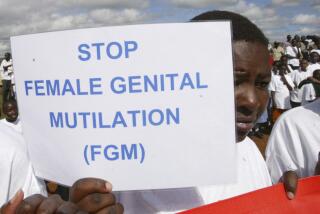Board to Hear Togo Woman’s Asylum Appeal
- Share via
WASHINGTON — As her hearing before a high-level immigration board approaches, a young woman who fled her native Togo because of the threat of forced genital mutilation seems likely to gain sympathetic treatment in a plea for political asylum here.
Fauziya Kasinga, 19, will present her case to the U.S. Board of Immigration Appeals on Thursday. Her attorneys will ask the board to grant her the asylum refused last year by a lower court or at least remand her case for a fuller hearing before the same judge.
Freed from 16 months of incarceration last week when immigration authorities took note of her plight, Kasinga has been supported by professors and students at the law school of American University in Washington. Her situation also has been the subject of stories in the press. The case is shedding light on a little-known tribal ritual designed to keep young women chaste in Africa and parts of Asia.
“I feel very happy to be here,” Kasinga told a news briefing Monday. She added that “I would be very happy if the whole world would end the practice,” which is sometimes referred to as female circumcision and which can lead to serious illness or death.
Human-rights advocates estimate that 60,000 women face the risk of this ritual every day in nearly 30 countries and that 100 million girls and women already have been subjected to it.
Kasinga’s plea is novel in that she is seeking political asylum on grounds that female genital mutilation amounts to persecution in her West African country.
Although an immigration judge in Philadelphia last year questioned the credibility of her claim, the Immigration and Naturalization Service has decided to take another look.
Now federal immigration lawyers are saying that Kasinga and women like her, under certain circumstances, may have a well-founded claim of persecution based on this “deeply objectionable” tribal ritual, which is usually performed without anesthesia and with unsterile knives, razors or chunks of glass.
In legal papers filed with the immigration board, David M. Dixon, an attorney for the INS, acknowledged that it is risky to grant political asylum to foreigners who are fleeing from “cultural practices” in their countries rather than from more traditional threats of persecution.
But, he added, “there is no doubt” that brutal practices such as genital mutilation, when forced upon women, “are validly the object of vigorous human rights protest.”
He suggested that the board might want to remand the case for a fuller exposition of the facts of Kasinga’s flight from Togo because her first hearing was relatively brief.
A spokesman for the immigration service said the agency will recommend that the appeals board use the case to establish guidelines for immigration judges.
Kasinga told reporters that her wealthy father had protected his four daughters from the tribal custom but that when he died she was taken in marriage by an older man she did not know who already had three wives. Two days before she was to be subjected to genital mutilation, she said, she fled with the help of a sympathetic relative.
Karen Musalo, who heads Kasinga’s legal team, said that until recently the young woman was held in “degrading” detention with accused drug dealers and rapists.
More to Read
Sign up for Essential California
The most important California stories and recommendations in your inbox every morning.
You may occasionally receive promotional content from the Los Angeles Times.












